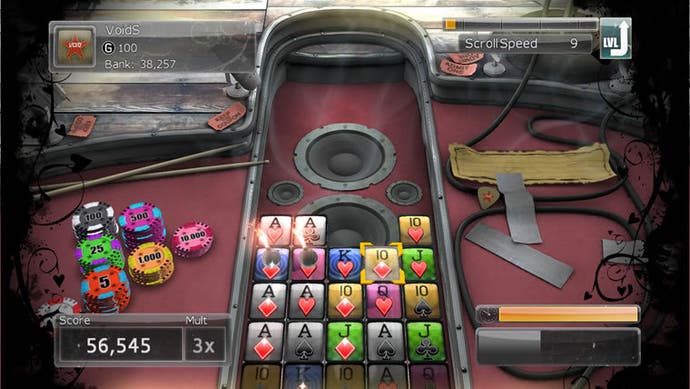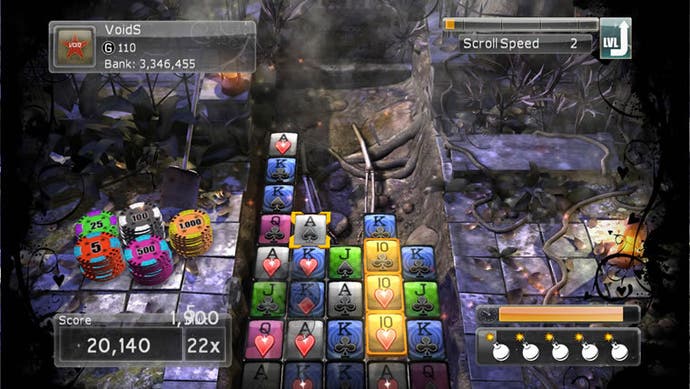Poker Smash
Just leave him alone, he'll tire himself out.
Poker Smash is a puzzle game where playing cards ascend a rectangular playing area like the one in Tetris. As they do, you can move any card horizontally without restriction with the right analogue stick, while the left is for simple selection. If there's a space for a card to fall into, it will - unless you sweep it across the gap at pace. The game's distinctive characteristic, as the title suggests, is that you clear cards by creating poker hands.
Except it's a bit simpler than that. Cards in play are tens, jacks, queens, kings and aces of all four suits, and the hands that work are three, four and five of a kind, flush, full house, straight and a royal flush. Create one of these hands horizontally or vertically and the cards involved disappear, leaving the ones above them to observe the puzzle game tradition of sliding into the exposed gap or gaps. If the cards reach the top of the play area in the two pressure modes, it's game over.
This sounds good in theory, but it doesn't play well. There's too much information to process at a glance - suits, card values, possible hands, and the consequences of moving individual cards around. Doing this at pace would be even more awkward were it not for the developer's trick of giving each of the five card values a particular colour, which scans better. Elsewhere, suit markers wink at you when a flush is sort of possible, and a stock of bombs allows you to burst out of dead ends if you can't steer things your way.

The result of all this is that you look for colour first, and then revolve through other possibilities when nothing's making itself obvious, reaching for the crutches when the columns start to shudder in anticipation of crossing the game-over line. Allowed to play it by colour, Poker Smash becomes a fairly standard three-in-a-row game where you occasionally catch something else out of the corner of your eye, or fluke an excellent hand. Processing the information quickens with repeat exposure, and the pressure-free practice mode helps, but not enough. It's at once too hard and too easy - perhaps explaining why it has both a 'speed up' button and a recharging slow-mo bar to utilise as conditions start to get the better of your reaction times.
Another reason to have speed-up is so you can introduce half-visible cards on the verge of entering the play area to whatever you're doing. The speed of the cards' ascent increases frequently in the standard endless mode, which also occasionally introduces an impromptu time-limited challenge (say, get five kings in a row), which nets you bonus points if you can meet it.
There's also a timed mode, a bit like Zoo Keeper DS's time attack, where you're given three minutes to amass the best score. Online leaderboards could make this bit work, but empirical evidence (i.e. what happens to me) indicates that you will never be the best in the world at this sort of thing, so make sure your friends are taking the plunge as well if this is something you find appealing.

The other mode is called Puzzle. Each task presents you with a little haystack of cards of different suits and values, and asks you to untangle them and leave none behind, at which point you progress to the next puzzle along. Yes, it's like the bits for capturing mounts in Puzzle Quest: Challenge of the Warlords, for those with a working knowledge of that game (and if you haven't, you have no business considering buying this - go deal with that first, and we'll see you next month).
Those Puzzle Quest bits were hardly amazing, though. In fact, we got so fed up with them that we fell back on the illustrated solutions on GameFAQS (a hero, whoever that was). You have to think too many moves ahead, and in several dimensions because you're considering suits, numbers, hands and manoeuvring implications along all those axes.
So Poker Smash doesn't really work. Borrowing familiar poker hands is a nice idea on paper, but the need to include colours, winking icons and bombs ought to have been clue enough to leave it there alongside the spider-web doodles. There's certainly nothing objectionable about the game per se, and it wallpapers the hours happily, with multiplayer bits that prove fairly moreish, but if you've got the cash equivalent 800 Microsoft Points about your digital person, you can either buy a better puzzle game elsewhere or - if it was the poker bit that enticed you - throw a few quid into the kitty of one of the ubiquitous online poker sites, read Wikipedia for the basic rules, and set yourself up for an evening on tables with one- or two-penny blinds.

